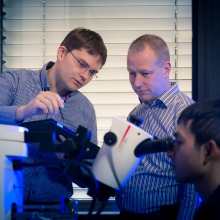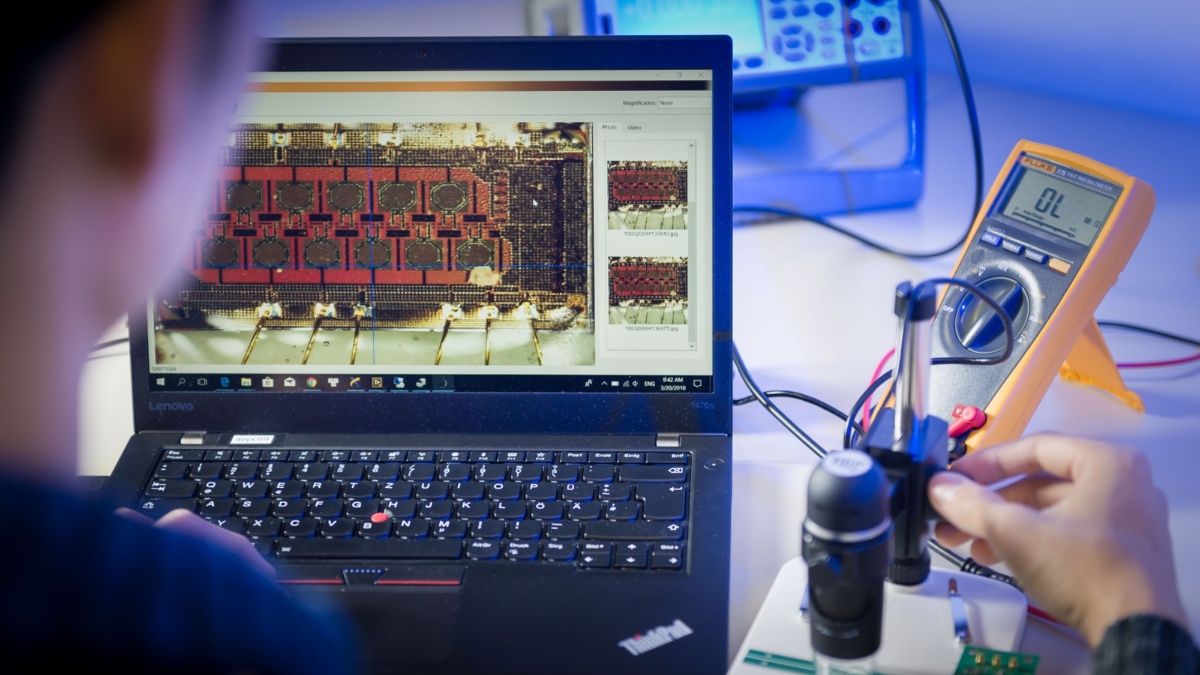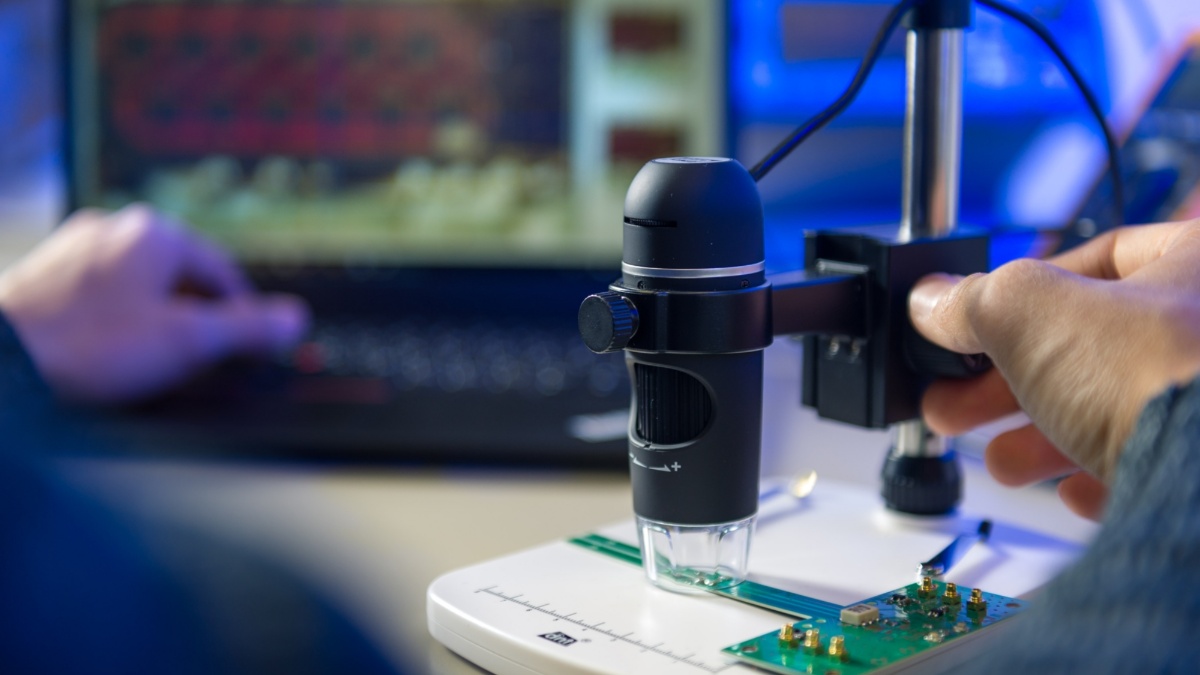They can detect cancer at an earlier stage, control prostheses, and measure the tiniest signals at the limits of what is theoretically feasible. Quantum sensors are at the cutting edge of sensor technology. A team led by Prof. Jens Anders, spokesperson for the cluster and Head of the Institute of Smart Sensors and Theoretical Electrical Engineering (IIS), and Prof. Jörg Wrachtrup, co-spokesperson and Head of the Institute of Physics (3) at the University of Stuttgart is carrying out research into quantum sensor technology as part of the future cluster “Quantum Sensors for the Future (QSens)”.
We’re making quantum sensors which are suitable for everyday use.
Prof. Jens Anders, spokesperson for the cluster and Head of the Institute of Smart Sensors and Theoretical Electrical Engineering (IIS)
QSens is a cluster initiative in which the universities of Stuttgart and Ulm, the Institute for Microelectronics Stuttgart (IMS CHIPS), the Hahn-Schickard Institute for Micro Assembly Technology (Stuttgart) as well as a total of 17 industry partners thus far have joined forces to make quantum sensors suitable for everyday use. It is one of the 16 finalists in the “Clusters4Future” competition for future clusters run by the German Federal Ministry of Education and Research.
“We’re making quantum sensors which are suitable for everyday use”, said Anders describing one of the objectives of QSens. The scientists want to develop highly-precise and inexpensive sensors for industry and end customers. The first quantum sensors should be mass produced within three or four years.
For the purpose of comparison, the quantum computer needs around a million physical qubits to beat a conventional computer, while quantum sensors can outperform all conventional sensors with just one qubit. Qubits are the basic unit of quantum computing, inspired by bits in traditional computing.
The industry has recognized the huge potential of quantum sensors. They can measure more precisely, which opens the door to countless new applications which are not possible using traditional sensors. Quantum sensors can record even the tiniest of signals and changes and measure more accurately than any previous sensor ever made, whether magnetic fields, acceleration or pressure. “We’re at the limit of what it’s physically possible to measure”, says Anders. Unlike traditional sensors, measurements made by quantum sensors often directly correspond with the reference values of the SI units for physical sizes. This removes the need to calibrate which would otherwise be necessary and thus saves money.
Quantum sensors in everyday life
The sensors developed by QSens are intended for use in everyday fields such as mobility, healthcare, the Internet of Things and sustainability. In the future for example, quantum sensors will be used to detect cancer before a patient shows any symptoms. To do this they measure the free radicals in the body which are a specific indicator for a variety of diseases, in particular cancer. Likewise, it will become possible in future for patients to selectively control prostheses via nerve impulses with the help of sensors. The next generation of satellite navigation systems, equipped with the latest quantum sensors, will identify their location much more precisely than today and thus make an important contribution towards autonomous driving.
Quantum sensors can also provide valuable help in terms of driver assistance. They observe the behavior of the driver. If he or she starts to get tired or has a medical emergency, the technology can send signals or take over the steering wheel to bring the car to a safe halt. It is also conceivable that people will control devices or everyday objects with their thoughts in the future instead of with their voice, such as for example telling the stereo system to change the volume or change the song. This would also be hugely advantageous for medicine. So-called “locked-in” patients who can no longer communicate would be able to make themselves understood again with the help of quantum sensor technology.
Tasks of QSens
Compared to their international counterparts, German universities and companies play a leading role in carrying out research into sensor technology. The Center for Integrated Quantum Science and Technology in Baden-Württemberg (IQST), with participation from the University of Stuttgart, is the leading organization in Germany in the field of quantum sensor technology. QSens wants to secure and expand on Germany’s leading position from a scientific and economic perspective. The main task of the cluster initiative is basic and application-oriented research. “QSens should serve as a bridge. We transfer the findings from the physics laboratory to industry and into people’s everyday lives”, says the QSens coordinator.
Furthermore, the researchers want to make quantum sensors available to the wider public by means of events, videos and science slams. “Quantum physics is not something supernatural. It’s normal physics which you need to use when working with very, very small energy differences”, explains Anders.
Swabian Instruments is a very successful spin-off from alumni of the University of Stuttgart. It develops extremely precise measuring devices for quantum physics and quantum technology.
Funding business ideas and start-ups is another of the tasks carried out by QSens. For this purpose the scientists have set up a so-called quantum incubator. This is where spin-offs which develop sensors are intended to be created. Since the start-ups manufacture hardware, it means that new jobs will be created in the medium and long term. “We’re hoping for further success stories like Swabian Instruments.” QSens is supported by the University of Stuttgart, more specifically by the Institute for Entrepreneurship and Innovation Science and the innovation platform Startup Autobahn.
Forming a new professional group
Thanks to all the progress made in the second quantum revolution, it is important for Anders to set up a new professional group which can master the challenges posed by this technology, both in theoretical terms as well as in terms of putting it into practice. He wants to bring together researchers from the fields of physics and engineering to train a new generation of future engineers: quantum engineers. “Thanks to the great support provided by the university and particularly by our Rector, Prof. Wolfram Ressel, we are going to create a new office at QSens dedicated to this task.” The office will be based in the Physics Didactics group at the Institute of Physics (5). A master’s degree program in the subject is also currently being developed.
Clusters4Future BMBF
“Clusters4Future” is a competition held as part of the German government’s High-Tech Strategy 2025, which was established to speed up the pipeline between excellent research and innovations. The “Quantum Sensors for the Future (QSens)” cluster initiative is also one of the 16 finalists after the first round of the competition, each of which has now been invited to submit a full proposal. A maximum of seven clusters will each receive funding of up to five million euros per cluster per year for up to nine years starting from 2021. An expert jury will review and assess the QSens cluster initiative at the end of January 2021.
Prof. Jens Anders, QSens spokesperson and Institute of Smart Sensors and Theoretical Electrical Engineering, tel: +49 (0)711 685-67250, E-Mail








